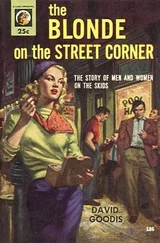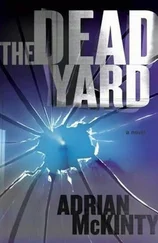I drove to a place called the Village Pancake House just over the town line in Ipswich. I got the pecan pancakes and they were excellent.
The realtor was a large bubbly woman called Buffy. She had blonde, curly hair and a perma-tan, and she was wearing a light blue leisure suit that made her look like a member of a cult.
She showed me inside the O’Rourke residence.
My hunch about the rented furniture proved correct.
All the late Mr O’Rourke’s effects had been cleared out “and the house fumigated”, Buffy assured me.
“What happened to Mr O’Rourke?” I asked.
“I heard that he wasn’t well and that he went home to Ireland to die.”
I told Buffy that I was a keen gardener and she showed me a completely empty greenhouse in the back yard – as empty as Sir Harry McAlpine’s had been.
I thanked Buffy and drove next to the VFW post. I wanted to talk to O’Rourke’s mates and I’d brought that roll of five hundred dollars I’d found behind the mirror, which I wanted to leave as a donation to his fellow veterans. I parked outside the small, white clapboard building and tried the door, but it was locked.
I got a coffee roll and a coffee from Dunkin’ Donuts on Route 1 and waited for any of O’Rourke’s VFW buddies to show up, but no one did. It was obviously way too early. I ate the coffee roll; it was great and made up for the coffee itself which tasted like it had been percolated through a tube previously used for stealing petrol from parked cars.
I drove back to O’Rourke’s house and rang the doorbell of the neighbours on either side. The Browns were not at home, but his other neighbour, Donna Ferris, a home maker in her forties, told me that Bill was an amazing guy. A very proud man. A great neighbour who could fix just about anything.
“You wouldn’t believe what he went through when Jennifer died. She was in so much pain. He tried to take it all on himself. They should have given that guy a medal.”
I told her that they had given him several medals, and this was news to her.
I asked her about his work for the government and she said that he never discussed it. She said that she was devastated to hear about his death. That he was the most honourable man she knew.
“Most people these days don’t even know what the word ‘honourable’ means,” she said.
At lunchtime I drove into Newburyport and found the Ten Cent Savings Bank. The main branch on State Street was not the one that contained the safety deposit boxes. I had to go to the adjunct branch on Jefferson Street; but I knew that already.
I had a toasted cheese sandwich at Fowles Diner and found a review of Fanny and Alexander in an old Boston Globe someone had left lying around. The reviewer liked the film, but didn’t say what happened at the end.
I walked down to the little harbour and strolled along a pier that had rows of lobster boats and fishing smacks. An attractive lady with a screaming infant asked me the way to the McDonald’s. I told here I was a stranger here myself and she hazarded a guess that I was from Down Under. “Belfast,” I said, and she smiled and wished me a pleasant trip.
I found an Irish pub called Molly Malone’s. It was an embarrassing explosion of kitsch and sentimental Oirishness. Comedic leprechauns jostled for space with photographs of the dead hunger strikers and framed newspaper headlines celebrating infamous bombings. There was a collection tin for the IRA on the bar and posters that said things like “Death to the RUC”, and “Death to the Brits”. No Mick with any self respect would ever drink in a place like this, which was why it was packed to the rafters.
I went next door to a dive bar and got a bottle of Sam Adams for a buck fifty. I knew that I was only delaying the inevitable, so I gulped my brew and went back outside.
Jefferson Street.
The Ten Cent Saving Bank’s adjunct branch was a brown concrete single-storey structure that had all the aesthetic charm of a nuclear fall-out shelter. But perhaps that was the point. Your stuff will be safe here even in the event of the apocalypse …
I took out my key and walked boldly inside.
You had to go past a clerk who was sitting behind bullet-proof glass.
He was a thin, bald man with a comb-over and a caterpillar moustache that conveyed a great well of sadness. He was reading The Parsifal Mosaic by Robert Ludlum.
The boxes, presumably, were in a room to his right behind a locked metal door.
“Key number,” the man said.
“Twenty-seven,” I said.
“Let me see it, please,” the man said.
I took out the key and passed it under the partition. He examined the key and looked at something in a book and passed the key back.
“Do you have any identification, Mr O’Rourke?”
I slid O’Rourke’s licence through the partition. I had a story ready that Mr O’Rourke had passed on and I was his son-in-law closing up his estate, either that or a policeman investigating his estate. I hadn’t completely decided on the narrative, but neither proved necessary. The guard nodded and passed the licence back and even though O’Rourke and myself looked nothing alike he pushed a buzzer which opened the inner door.
I went through into the next room which was a kind of antechamber. An armed security guard was sitting on a stool and staring into space. He was a big white guy, about thirty, who looked like he could handle himself. There was a TV monitor above his head.
“Good morning,” he said, cheerfully enough.
“Good morning,” I replied.
The boxes were behind an armoured door. “Through here?” I asked.
“Yeah. Take as long as you like,” he said. “But we close at four.”
“Thank you,” I said.
“I’ll buzz you through and lock you in, but I’ll keep an eye on you on the TV monitor. When you want out, knock the door one time. I’ll hear.”
“Okay.”
He unlocked the armoured door and I went inside the room and waited until he closed the door again. There were a hundred safety deposit boxes in two rows. In the centre of the room there was an oak table.
I went to box 27, put the key in and turned it.
I pulled out a long metal box and set it on the table.
I opened the box.
Inside was a brown envelope.
I opened the envelope.
Photographs. A dozen 8x10s. Black and white, taken with a telephoto lens.
They were all of the same subject.
A group of four middle-aged men having some kind of meeting at a restaurant. There were photographs of the men going inside the restaurant, photographs of the men sitting by the window and shots of them coming out again.
One of the men, unmistakably, was John DeLorean.
I stared at the photographs for five minutes to confirm that I was right, but there was no possibility of a mistake. Who the other men were I had no clue at all, and I wasn’t sure where the photographs had been taken. The only car I could see was a Volkswagen Beetle, and you can get those all over the western world.
I put the photographs back in the envelope and put it under my arm.
I closed the empty safety deposit box and locked it.
I knocked on the door.
The guard opened the door and buzzed me into the street.
The sunlight startled me.
What to do now?
Only one thing to do now. Find out who these men were. Who was DeLorean meeting and why had O’Rourke taken photographs of the meeting? And why were the photographs in a safety deposit box? And who the fuck was O’Rourke?
Jesus, what the hell was going on?
Should I take this to the local peelers or the FBI? Maybe. But, I’d have to think about it. Have a think, find a phone box, maybe call Crabbie, get it all sussed.
I walked to my car which was parked in the lot behind State Street.
Читать дальше










